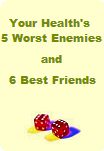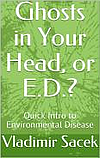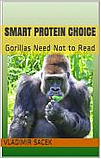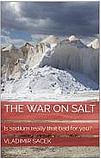"Why
is everything that tastes good unhealthy, and what is healthy tastes
yucky?" That was a straight kid's question to the friend of mine. He
laughed, but all he could say at the moment was: "Good question!".
And it really is. Because it makes you think. What is it about the
link between health and disease that we don't understand? Are we
victimized by the fast changing world we fail to adapt to? Hundreds
of thousands of years of roaming the Earth trying to survive, have
left us with
deeply rooted cravings
for - then
scarce - life sustaining essentials:
proteins (for tissue building
and basic body regulatory functions),
sugars (for instant and
readily available energy),
fats (for proper cellular function and
stored energy) and salt (for basic metabolic processes).
We still have the cravings, but now
we also have
lots of food at hand.
Does that spell trouble? You bet.
Our bodies had no time to adjust. We still feel hunger for up to 20
minutes after we have already consumed what the body needs - a
recipe for obesity. We are partial to foods that are source of
energy - fats and sugars (which includes most processed
carbohydrates) - and that "sweet toot" tends to throw our diet out
of balance. The more off we are nutritionally, the less efficient
body function, and the more we crave energy foods - welcome to the
vicious circle! What once was crucial for survival, now
threatens to wreck our health and
wellbeing!
But the main problem is that those "energy foods"
we crave are, in fact, nutritionally inferior, processed foods. Our
bodies haven't learned to be that picky, to differentiate between
good and bad foods. Back then, it was all good. It was by far more
important to make it to the next day, than how it will affect your
health in ten or twenty years from now. Beside, there was very
little of trans fatty acids and
nutritionally depleted, processed foods on the menu to begin
with.
There are always new things to learn for us, and a
few are as important today as it is to
avoid the trap of health-robbing junk
foods.
As if it wasn't enough, a new nemesis has
surfaced: toxic contaminants of all kinds are in our food, air and
water. Today, we are literally
soaked in
toxins,
without being blessed by
the
natural ability to prevent their bodily accumulation, or at least
neutralize their harmful effects on health. The tide of chemicals
and their adverse effects on health came so quickly, it left
medicine lagging behind. The combined effect of health-robbing diet
and toxic contamination can be devastating, as proven by the
epidemic of degenerative diseases and cancers.
And what makes all this
only worse, is that many of us are unknowingly letting the body to
be deprived of sufficient water.
Hidden chronic dehydration makes vital body functions, including
detoxification, chronically less efficient, leaving the body more vulnerable to diseases.
On top of that,
potentially harmful exposure to electromagnetic
energy is much
higher than it ever was in our history. While it is still obscured
by what specific mechanisms it effects biological processes -
pretty much in common with numerous symptoms and diseases generally
known as environmental illness - it is a subject of the ongoing
scientific research.
One could say,
we
are guinea pig generation.
It is on our flash and
blood that the knowledge of health preservation in this quickly
changing world will be gained. The only choice we have is whether we
will participate actively, learning about what is happening to us
and adjusting to it the best we can, or stay ignorant and pay the
price.
These days, more than ever before, you can't
afford to be indifferent, or ignorant about your
health - the risk
is just too high. More than ever before, we need to know
how to protect, or regain health.
Where is the
danger lurking. What matters. What are the right choices. Where to
turn to, and who to trust to.
And, remember,
it is not only about you, or those you are living with. The
latest research has documented that all sorts of factors in your
life - from what and how much you eat, to your stress and chemical
exposures - have the power to negatively affect genetic quality of
one's reproductive material. What was thought of as inherited
genetic vulnerability, predisposing people to developing various
diseases, very often results from what and how our close ancestors
have lived - not from some cast-in-stone genetic code.
By taking good care of yourself, and those you
love, you are also protecting those that are yet to come.
Why not
just let doctors take care of everything? In the first place,
because you don't want to become sick for you were ignorant of what
can harm you. More so because your prospects of regaining health are
bleak. The fact is, in this era of pharmacological medicine, the
purpose is to medicate, not cure. As a result, the average doctor
knows much about medicating, and very little about supporting
health.
You'll find very few doctors that practice according to a
very simple truth, which is that your physical health can only be preserved,
or restored
by matching your nutrient intake
with your individual nutritional needs,
and keeping poisons out of your body.
But even best doctors can't live
healthfully for you - you have to do it yourself. And for that, you
need to be able to make the right choices. That brings us to the
five pillars of health:
Yes -
you are unique in every respect,
and the only
proper care of your health has to be based on that fact. There is no
shoe that fits everyone: no drug, no herb, no supplement, no diet,
no lifestyle does. Moreover, your own needs change with your
lifestyle, health condition and age. And the only way to find out
what is good for you - and what isn't - is to
get to know your
body and its state of health.
That is where proper
diagnostic tests
fit in. That is also the only way to solve the
symptom puzzle, when a disease
shows its ugly head.
Every disease is a combination of adverse nutritional, environmental and
genetic factors loosening your body's grip on health. You have to be
aware of these factors in order to prevent disease from happening,
or to have it reversed.
As you know, when it comes to the
subject of health, there are many sources, and information is often
confusing, not seldom contradictory. Facts are often purposely
distorted in support of big special interests. Hence, the best possible choice
is to rely as much as possible on the information coming from actual practicing of cause-oriented,
healing medicine, based on the advances in independent scientific
research in molecular and
environmental medicine.
As Dr. Rogers says at
the very beginning of one of her early books, this is not for
everyone; it is for those sick enough, or smart enough. I hope you
are in this latter group. If not, don't despair; there is little
that body can't do to heal, if you only give to it what it needs.
My main sources are listed in the
reference section of the
site
map. Needless to say, your feedback is greatly appreciated. The
subject of human health covers overwhelmingly many topics. Like the
old Celtic heath-knot, it doesn't seem to have beginning, or end - there
will always be much that can be added, updated or bettered.

Vladimir Sacek,
site author
TOP







